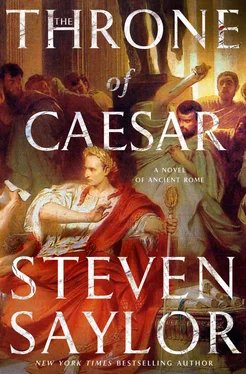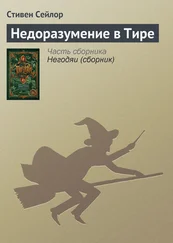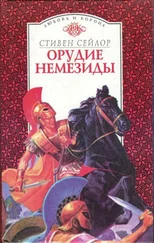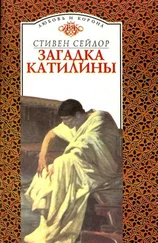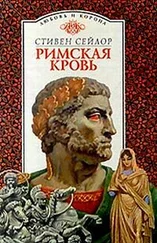Стивен Сейлор - The Throne of Caesar
Здесь есть возможность читать онлайн «Стивен Сейлор - The Throne of Caesar» весь текст электронной книги совершенно бесплатно (целиком полную версию без сокращений). В некоторых случаях можно слушать аудио, скачать через торрент в формате fb2 и присутствует краткое содержание. Год выпуска: 2018, Издательство: St. Martin's Press, Жанр: Исторический детектив, на английском языке. Описание произведения, (предисловие) а так же отзывы посетителей доступны на портале библиотеки ЛибКат.
- Название:The Throne of Caesar
- Автор:
- Издательство:St. Martin's Press
- Жанр:
- Год:2018
- ISBN:нет данных
- Рейтинг книги:5 / 5. Голосов: 1
-
Избранное:Добавить в избранное
- Отзывы:
-
Ваша оценка:
- 100
- 1
- 2
- 3
- 4
- 5
The Throne of Caesar: краткое содержание, описание и аннотация
Предлагаем к чтению аннотацию, описание, краткое содержание или предисловие (зависит от того, что написал сам автор книги «The Throne of Caesar»). Если вы не нашли необходимую информацию о книге — напишите в комментариях, мы постараемся отыскать её.
The Throne of Caesar — читать онлайн бесплатно полную книгу (весь текст) целиком
Ниже представлен текст книги, разбитый по страницам. Система сохранения места последней прочитанной страницы, позволяет с удобством читать онлайн бесплатно книгу «The Throne of Caesar», без необходимости каждый раз заново искать на чём Вы остановились. Поставьте закладку, и сможете в любой момент перейти на страницу, на которой закончили чтение.
Интервал:
Закладка:
As we drew closer to the theater, I heard a roar from within. At first I thought the cheering must be for Caesar. Then I remembered that a gladiator show was being presented that day, with the combats and killing to take place on the stage. Apparently the program was already under way.
“A gladiator show, on the festival of Anna Perenna,” I remarked. “And from the sound of it, the theater is packed. Who would want to watch gladiators hack each other to death on such a fine spring morning?” I sighed. “I suppose those of us too old, or too married, or too chaste, or too sober to celebrate Anna Perenna can enjoy a bit of bloodshed instead.”
“That’s Rome. Something for everyone!” said Meto with a grin. How happy he was that day, walking beside his father in Caesar’s entourage.
We rounded a corner and passed by one of the main entrances to the theater. I saw a great many gladiators milling about. None of them appeared to be handling swords or tridents, but some were wearing armor, and all looked restless and surly.
“Why are those gladiators outside the theater, instead of inside?”
Even as I asked, I saw Decimus leave Caesar’s side and walk to the man evidently in charge of the gladiator troupe. Decimus, looking quite serious, appeared to be giving the man instructions.
“I think those gladiators are owned by Decimus,” said Meto. “There’s some dispute between him and the presenter of today’s show about a valuable gladiator who was stolen or lured away. I suspect Decimus’s men are here to take back his property—by force, if necessary.”
“What if a brawl breaks out?” I said.
“Then the audience will get more bloodshed than they bargained for.”
Decimus finished talking to the man in charge of his gladiators, then hurried to catch up with Caesar’s litter. Caesar, glancing at the gladiators, appeared to ask a question, and Decimus appeared to answer.
“Caesar probably wishes he were attending the gladiator show today, instead of addressing the Senate,” said Meto.
What an appetite our dictator has for bloodshed and suffering, I thought. What a connoisseur he is, of all manner of mayhem and death. And now he is about to head for Parthia, to unleash untold havoc in a whole other part of the world, carnage and destruction on an unimaginable scale.…
But all I said to Meto was, “I, for one, have no wish to see blood shed today.”
Looking back at Decimus’s gladiators, I felt suddenly apprehensive. I was merely nervous, I thought, as any man would be on the day he was to stand before the Senate and give a speech, however simple and brief, with the likes of Cicero and Caesar watching and listening to every word.
XXXIII
We arrived at the large courtyard outside the Senate House of Pompey. Crowds of senators milled about, some standing on the broad steps leading up to the building’s entrance. Many hailed Caesar; others kept their mouths shut. Some looked restless and bored after waiting hours for Caesar to arrive. Cicero, standing on the steps and attended by Tiro, looked particularly petulant. Side by side, Brutus and Cassius were pacing back and forth at the top of the steps. They looked especially uneasy, but also relieved, I thought, like men who had pressing business to attend to, and now, with Caesar’s arrival, could at last get on with it.
Antony, with a smile on his face, came striding down the steps to meet Caesar as he stepped from his litter. “So you decided to come, after all,” I heard him say. “Very good! As soon as we’ve taken the auspices, we can all get to work.”
On a raised platform at the foot of the steps, Spurinna stood before a large stone altar. There were also a number of priests holding ceremonial knives for slaughtering and cutting open sacrificial animals. As presiding haruspex, Spurinna would examine the entrails and determine whether the auspices were good or bad for the Senate to meet on this day. If necessary, more than one animal might be sacrificed. Amid the throng of togas in the courtyard I caught a glimpse of the pens in which they were kept and heard the bleating of goats.
Caesar strode through the crowd of senators and mounted the raised platform, facing Spurinna across the altar. Meto and I stood in the crowd behind Caesar, so that I could clearly see the face of Spurinna on the opposite side. As Pontifex Maximus, it was up to Caesar to signal that the taking of auspices could begin. He raised his hand and nodded.
A goat was brought forth on a leash held by a priest. The animal willingly stepped onto the dais—a good sign. The priests proceeded to bind the animal’s legs and lift it onto the altar. The goat bleated loudly, but kicked and struggled only a little—another good sign. The more willingly the animal meets its death, the more likely the auspices will be good. Caesar nodded approvingly.
One of the priests raised a knife high in the air, recited a prayer, then deftly cut the goat’s throat. The animal convulsed. Priests twisted the goat’s head to one side so that channels carved into the altar would carry off the spurting blood. The animal’s legs were quickly unbound. Each taking hold of a trembling foreleg and a hindleg, two priests exposed the goat’s underside, allowing Spurinna, at the exact moment of death, to slice the goat open from the base of its throat to its navel.
Spurinna put aside his knife and peered at the exposed entrails. He frowned. He shook his head. He grunted.
“By Jupiter, man, what is it?” demanded Caesar.
“Dictator, part of the liver is missing. And the color of the viscera around the heart is … abnormal. There’s a greenish tinge—”
“What of it?”
“Dictator, the omen is not good. Not good at all. Any deformity of the liver speaks of danger. Green viscera, too, signals a threat—”
“Spurinna, I’m not having this,” said Caesar, leaning forward and speaking so quietly that I heard him only because every senator around us was completely silent, as we all held our breath.
“Dictator, I can only report what I observe—”
“Bring forth another sacrifice!” said Caesar, raising his voice.
The operation was repeated. This time Spurinna observed a knot in the bowels that indicated aborted plans and disappointments. Caesar was again displeased.
Another goat was brought forth. Perhaps alerted by the smell of blood and the bleating of the previous sacrifices, this one struggled at every stage, refusing to step onto the dais so vigorously that it almost escaped, then kicking and thrashing as its legs were bound, then twisting so violently that the priest charged with killing it had to make not one but two cuts with his knife.
As the animal died, Spurinna stepped back and lowered his knife. “Dictator, the resistance of the sacrifice speaks for itself. There’s no need to cut it open. I can already tell you—”
“You will say not another word, haruspex,” said Caesar, in a tone I had never heard from him before. Spurinna shut his mouth and trembled, as if a chill wind blew over him.
Caesar instructed the priests to untie the goat and take it away. He looked at the silent, grim-faced senators gathered in the courtyard and on the steps. He smiled. “Something very similar happened in Spain, when I was about to engage with Pompey’s forces there. Three goats were said by the haruspex to be unfit, all three ill-omened. Do you know what happened? I went into battle anyway, and on to victory. Had I listened to the haruspex that day, it would be Pompey standing here instead of me. The auspices can be very difficult to interpret. Even the most experienced haruspex…” Here he looked at Spurinna. “Even the most experienced haruspex can be mistaken. As Pontifex Maximus, I declare the taking of these auspices to be inconclusive. The will of the gods cannot be clearly discerned. In light of the importance of this meeting, we shall proceed.”
Читать дальшеИнтервал:
Закладка:
Похожие книги на «The Throne of Caesar»
Представляем Вашему вниманию похожие книги на «The Throne of Caesar» списком для выбора. Мы отобрали схожую по названию и смыслу литературу в надежде предоставить читателям больше вариантов отыскать новые, интересные, ещё непрочитанные произведения.
Обсуждение, отзывы о книге «The Throne of Caesar» и просто собственные мнения читателей. Оставьте ваши комментарии, напишите, что Вы думаете о произведении, его смысле или главных героях. Укажите что конкретно понравилось, а что нет, и почему Вы так считаете.
